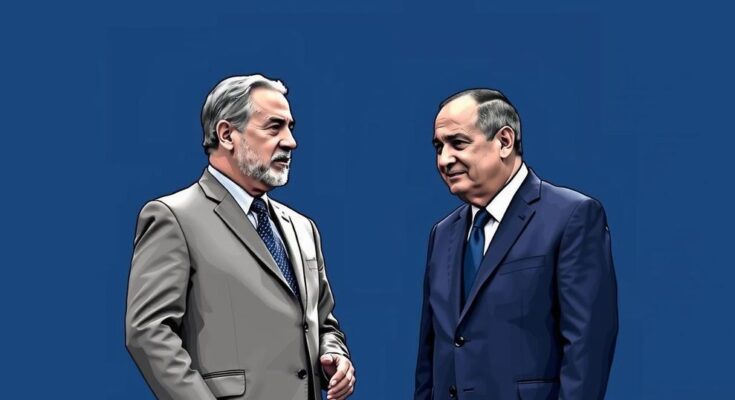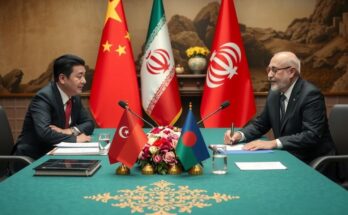Secretary of State Antony Blinken is visiting Israel to push for a cease-fire in Gaza and greater humanitarian access, while addressing tensions with Hezbollah in Lebanon. Despite previous negotiations failing, he aims to engage Israeli leadership and discuss potential governance solutions for post-conflict Gaza, amidst significant humanitarian concerns and ongoing violence.
United States Secretary of State Antony Blinken is undertaking his 11th visit to the region, focusing on negotiations aimed at reviving cease-fire discussions regarding Gaza and enhancing humanitarian access, while also addressing the ongoing conflict between Israel and Hezbollah in Lebanon. His scheduled meetings include discussions with Israeli Prime Minister Benjamin Netanyahu and Defense Minister Yoav Gallant. Blinken’s visit comes amid a challenging backdrop, as previous negotiations facilitated by the United States, along with Egypt and Qatar, have failed to yield a permanent cease-fire or the release of hostages captured by Hamas. Despite this, a senior State Department official expressed uncertainty over the immediate revival of talks, particularly following Israel’s assassination of Hamas leader Yahya Sinwar. In addition to his meetings in Israel, Blinken is expected to travel to Jordan shortly thereafter. The official noted that if a cease-fire is not established, discussions with Arab leaders would focus on potential governance frameworks for Gaza after the conflict subsides, with the U.S. prepared to engage in direct dialogue regarding post-conflict plans with Israeli officials. According to Nimrod Goren, a senior fellow at the Middle East Institute, notable discrepancies remain between Israeli and Hamas positions regarding cease-fire terms, complicating potential diplomatic progress. He stated, “The gaps are major; basically, Israel wants Hamas not to govern Gaza anymore and not to exist in Gaza anymore as a security threat, and Hamas wants the opposite.” The U.S. government has raised concerns regarding the dire humanitarian conditions in northern Gaza. State Department Deputy Spokesman Vedant Patel articulated these concerns, saying, “Certainly, nobody in the U.S. government is going to stand in front of you and say that we are satisfied or find the humanitarian situation in any part of Gaza satisfactory… We are seeing truckloads enter the Gaza Strip and will continue to press for more.” Concurrent with Blinken’s efforts in Israel, U.S. envoy Amos Hochstein is engaging in discussions in Beirut aiming for potential resolutions along the Israel-Lebanon border. Hochstein described his meetings as “constructive” and emphasized the importance of implementing U.N. Security Council Resolution 1701, which sought to delineate actions for both Israel and Hezbollah following the 2006 conflict. He remarked, “The people of Lebanon, like everyone in the region, just want to go home, build a peaceful, secure and safe prosperous future for themselves and their families.” As violence persists, Israel’s primary objective continues to involve countering Hezbollah’s proximity to its borders, while attacks from Hezbollah were initiated following Hamas’s assault on October 7, 2023. The resultant toll from the fighting has been substantial, with the Gaza Health Ministry reporting over 42,600 Palestinian deaths since the onset of Israel’s response, which does not differentiate between militants and civilians. Notably, both Hezbollah and Hamas have been designated as terrorist organizations by the United States, United Kingdom, European Union, and other nations.
The current conflict traces its roots back to a series of escalations that began on October 7, 2023, when Hamas launched a significant attack on southern Israel, resulting in approximately 1,200 fatalities and the abduction of around 250 individuals. In retaliation, Israel initiated a counteroffensive in Gaza, which has led to a considerable loss of life among Palestinians. The situation has drawn international attention, with calls for humanitarian access to Gaza amid ongoing hostilities. Secretaries of State have historically played a crucial role in mediating Middle Eastern conflicts, and Blinken’s repeated visits indicate a U.S. commitment to peace negotiations. However, the complexities involved, particularly relations between Israel and Hamas, challenge the establishment of a lasting resolution. The humanitarian crisis in Gaza is drawing increased focus from international actors, highlighting the urgent need for negotiations aimed at alleviating civilian suffering.
In summary, Secretary Antony Blinken’s visit to Israel seeks to address critical issues surrounding the ongoing conflicts in Gaza and between Israel and Hezbollah. While the foundations for peace negotiations and humanitarian aid access remain precarious, the situation demands urgent attention from both local and international stakeholders. The discourse on post-conflict governance and the various challenges presented by the divergent aims of involved parties suggest a protracted path towards achieving stable resolutions that ensure the security and humanitarian needs of all affected regions are met.
Original Source: www.voanews.com




